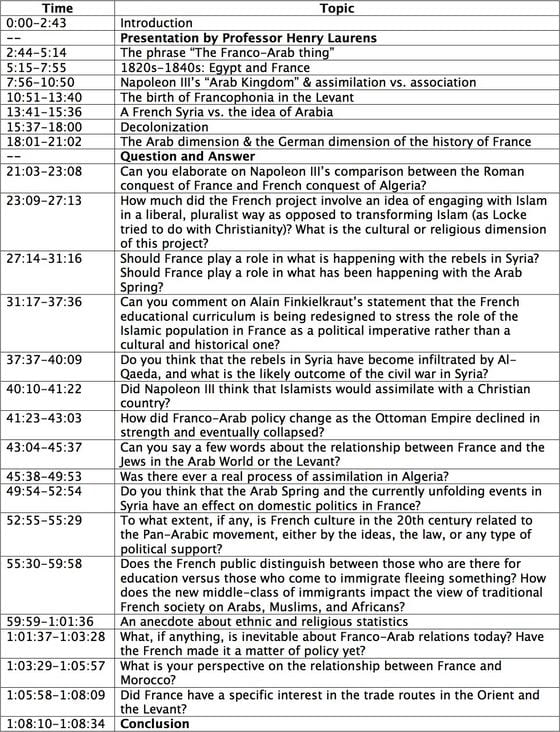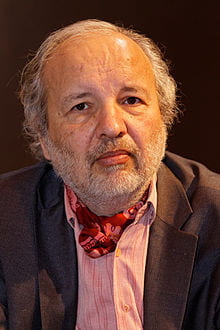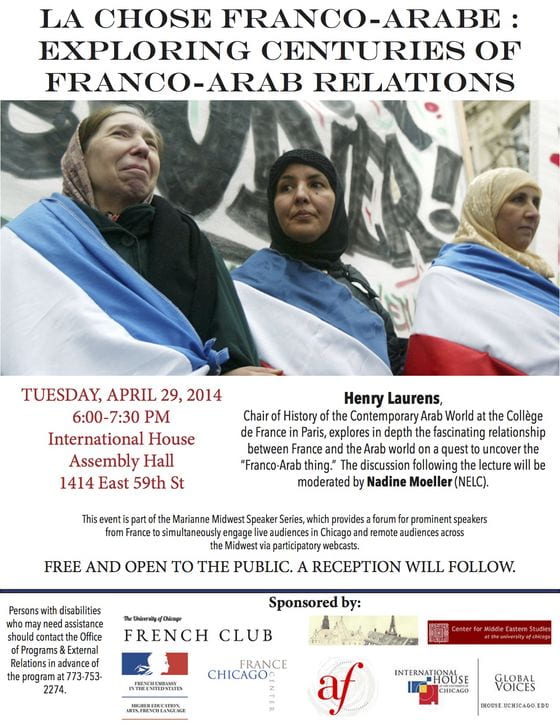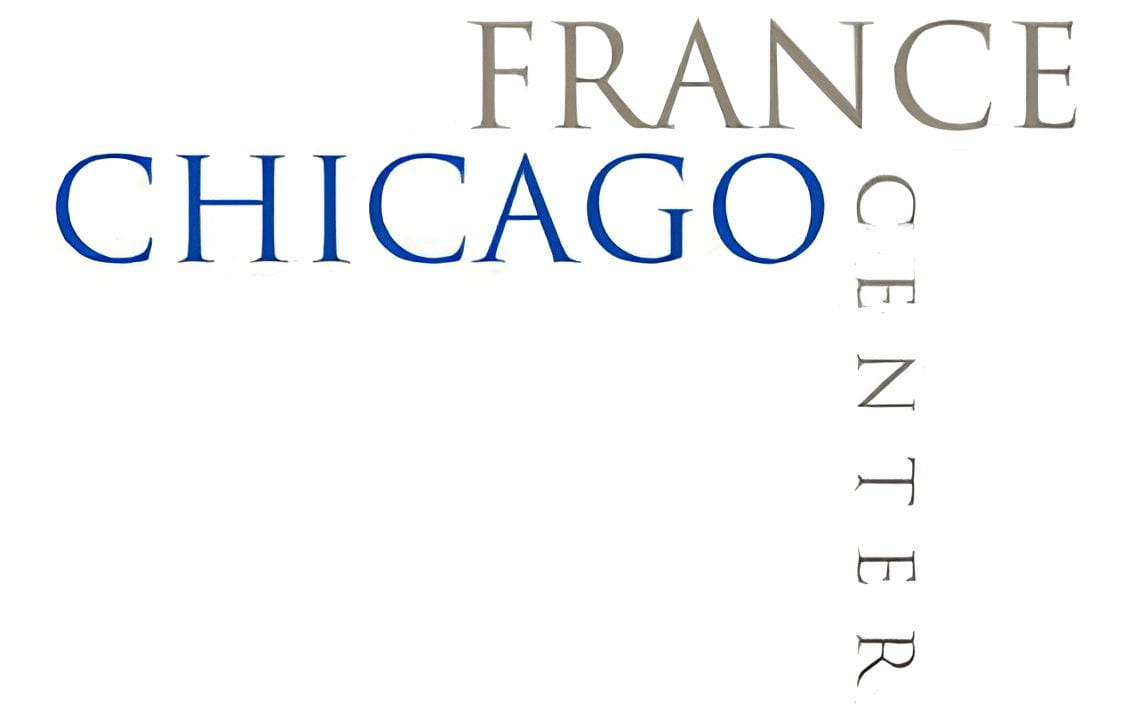The Franco-Arab Thing: Exploring Centuries of Franco-Arab Relations
April 29, 2014
1 hour 8 minutes
International House, University of Chicago
Program Overview
Omnipresent in discussions of contemporary France, Franco-Arab relations take root in centuries of shared history, turmoil and cultural exchange. Henry Laurens, one of France’s foremost experts on the Middle East and Chair of History of the Contemporary Arab World at the Collège de France in Paris, explores in depth the complex and fascinating relationship between France and the Arab world, from colonialism to present-day tensions, on a quest to uncover the “Franco-Arab thing.”
The program begins with an explanation of the origin of the phrase “the Franco-Arab thing” before moving on to an overview of the history of the relations between France and the Arab world. Professor Laurens describes Egypt of the 1820s, policies of assimilation and association, Francophonia, and decolonization. He concludes with what he calls the Arab and German dimensions of the history of France and their modern day manifestations.
Nadine Moeller (Department of Near Eastern Languages and Civilizations) moderates the discussion following the lecture. The audience in Chicago and in the participating satellite locations in Minneapolis, Cincinnati, Kansas City, and Milwaukee ask a range of questions varying from the historical policies of Napoleon III to contemporary issues, such as the conflict in Syria and French educational reform. Zineb Chraibi serves as the interpreter throughout.
Outline of the Program

About Henry Laurens

A historian and specialist of the Arab world, Professor Henry Laurens is the chair of Contemporary History of the Arab World at the Collège de France. Before he started teaching at the Collège de France in 2003, he taught at the Institut National des Langues et Civilisations Orientales (INALCO). For four years, he was a member of the High Council of the Institute of the Arab World in Paris. He has published various works including three volumes on the history of Palestine. In 2004, he was awarded the Joseph du Theil prize from the Académie des Sciences morales et politiques.
Discussion Questions
1. Professor Laurens states, “Of course there are many difficulties, but today one must understand that there is a French part to the Arab identity and an Arab part to French identity.” What aspects do you think are part of the French identity? Similarly, what are integral parts of the American identity?
2. How do you situate the two major current problems of France mentioned by Professor Laurens, the role of Europe and the place of Islam, in the context of the history of Franco-Arab relations?
3. Professor Laurens claims that French policy was built of two references: assimilation and association. What are the effects of these policies?
4. How do you see the role of religion in the relationship between France and the Arab World?
5. What do you think about the comparison that Professor Laurens makes between France’s relationship with Muslims and the United States’ relationship with Latinos?
6. What effect does historical context given in Professor Laurens’s presentation have on your perception of the contemporary issues in Syria?
7. How does this program about Franco-Arab relations connect to the previous program, “Neither Whores nor Submissive,” about the burqa ban in France?
Online Resources for More Information
France mulls overhaul of ‘assimilation’ policy towards immigrants (The Telegraph)
This article connects France’s policy of assimilation to the controversy about the headscarf ban in place since 2004. It explains the debate over French identity and the integration of France’s immigrant populations. Also, it talks about educational policy and questions whether French schools should emphasize the “Arab-Oriental” aspect of French identity.
Modern Period: The Rise of Colonial Interests in the Middle East (University of Notre Dame)
This article from University of Notre Dame’s OpenCourseWare provides an overview of colonialism in the Middle East, divided into four main time periods. It starts in 1699 with a century of decline and reform. Then, it describes Napoleon’s Egyptian expedition and European control, mentioning the Sykes-Picot Treaty. Next, it explains the period of decolonization. The last period, 1962 to the present, covers the effort towards Pan-Arabism and the rise of Islamists.
The Guardian presents the opinions of Michèle Tribalat, a French demographics expert, and of Gérard Mauger, a French sociologist, on the issue of religion and class in the suburbs of France. Citing demographic studies, Tribalat describes the interaction of Islam with secular France. Mauger discusses what he refers to as the “immigration problem” in the suburbs and the divisions within the working classes.
Great Debate: What does it mean to be French? (NBC World News)
In this article from 2009, the author provides an overview of the contentious debate over French national identity. The article explains that France values secularism, but it houses the largest Islamic population in Western Europe. While the end of the text questions the timing and necessity of the debate, the article speaks to Professor Laurens’s statement about an Arab aspect in French identity.
Hollande faces France’s bitter colonial past in Algeria (France 24)
This article from 2012 takes place 50 years after the Algerian war for independence. It describes President François Hollande’s visit to Algeria. The article details the tragic impacts of the war. Tension between the Algeria and France remains and many Algerians demand an apology from France.
Arab Spring: an interactive timeline of Middle East protests (The Guardian)
This interactive timeline provides a detailed, interactive timeline of the “Arab Spring” in seventeen Middle Eastern countries from December 12, 2010 to December 17, 2011. It begins with the self-immolation of a man in Tunisia and the riot that ensued. From there, one can click on each marker on the timeline to read articles about the events.
Syria Civil War Fast Facts (CNN)
CNN World provides a timeline overview of the Syrian Civil War from March 2011-February 2014. It begins with the arrest of teenagers who wrote political graffiti and describes the events of the conflict until the U.N. Security Council resolution about humanitarian aid. This article provides context for the various questions asked during the program referencing the events in Syria.
How far can foreign intervention in Syria go? (France 24)
This article from 2013 by French journalist Sylvain Attal examines the possibility of foreign military intervention in Syria. Both the U.S. Secretary of State and the French Foreign Minister have made decisive statements, but most countries are hesitant to interfere. The article concludes with two main options for and the risks of interference.
Other Resources
Video: The Arab world: the historian and current events (Collège de France 2014)
In this interview from the Collège de France, Henry Laurens discusses how the historian reacts to current events in the Arab world, as well as the geopolitical and historical approaches to the events. He talks about the influence of the media and his attempt to organize the data from the events. Then, he reiterates and clarifies what he means by the German and Arab dimensions of France’s interactions.
Video: An ongoing tie to Arab Civilization (Collège de France 2014)
In this interview from the Collège de France, Henry Laurens begins by discussing the history of academic interest in the Arab world. He explains how part of French culture is linked to Arab and Muslim culture. Finally, he considers a new awareness of a shared interiority between the two cultures.
This book by Raymond Betts, a professor of history at the University of Kentucky, explains the colonial theory of assimilation used by France at the end of the nineteenth century. Then, he examines the shift in French policy from assimilation to association.
In this book, Professor John R. Bowen examines how French Muslims think about Islam. He describes the controversy over the extent to which Islam should be adapted to its social conditions. He claims that Islam’s context in French society has caused Muslims to think about religious issues in new ways.
This program made possible with the support of the following
Consulate General of France in Chicago
Alliance Française in Chicago
France Chicago Center
UChicago French Club
Center for Middle Eastern Studies
International House Global Voices Program

